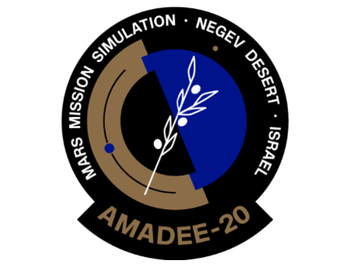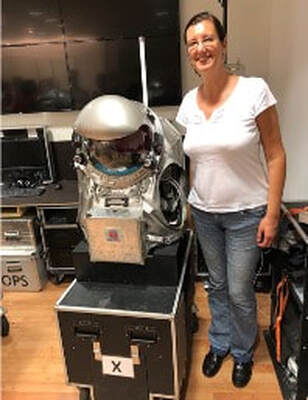Author: Karin Brünnemann, PMP®Karin Brünnemann is PMI Slovakia’s first interplanetary project manager. Karin has more than 25 years of experience managing global strategic projects. She helps companies during phases of cultural change and digital transformation. Apart from being a PMP®, Karin is also a certified trainer for intercultural management. She is currently using her project management expertise in her work as a Flight Planner for the Austrian Space Forum’s AMADEE-20 analog Mars mission.
The AMADEE-20 analog Mars mission took place in Israel’s Negev desert during October 2021. Over the course of four weeks, an international crew of six analog astronauts conducted a number of experiments to study human behaviour and well-being; tested technical equipment, vehicles, and space suits; and deployed platforms and procedures in the areas of geoscience and life detection. A further aim of this Mars simulation was the development of a state-of-the-art Mission Support structure. I joined the AMADEE-20 team as a Flight Planner two years ago. In this role, I have been using my project management skills to help prepare and conduct scientific experiments as a member of the Mission Support team. Each experiment can be viewed as a subproject in itself and needs to be managed meticulously.  Sarah Feilmayr/OeWF (Austrian Space Forum)© Sarah Feilmayr/OeWF (Austrian Space Forum)© There are many similarities between my work as a Project Manager on Earth and my assignment as a Flight Planner for the analog Mars mission. To begin with, a Mars mission, whether simulated or real, is of course, a project. It is humanity’s most challenging, complex, risky, and expensive project. Like any other project, it can be divided into process groups. I started work on the AMADEE-20 Mars simulation during the planning process. One of my main tasks as a Flight Planner at this stage was to obtain a full and very detailed description of the experiments (subprojects) I had been assigned to. The output of these descriptions are documents comparable to a project charter. Since time “on Mars” is very limited during the mission, resources have to be assigned very carefully to the different experiments (subprojects) in order not to run into any resource conflicts. Furthermore, just like international projects on Earth, (analog) astronauts and Mission Support team members will experience cross-cultural differences and will be trained to handle them. One major difference between the projects I am normally working on, and this Mars simulation is the detail to which experiments (subprojects) have to be managed. Usually, I plan tasks for my project teams on a daily basis. For analog Mars projects, we have to plan tasks in time slots of 15 minutes. During a simulated and later real Mars mission, astronauts must wear space suits to protect themselves from the hostile environment on our neighbouring planet. As it takes a long time to put on a space suit and as they are very heavy and not comfortable to wear and work in, the time the astronauts can spend outside their habitat is very limited and therefore, very valuable and must be scheduled in great detail. Another difference is the high risk to human life and well-being, as well as to the safety of the usually very expensive equipment. Communication also poses a big challenge. The entire team has to almost learn a new language, consisting of many acronyms specific to space exploration. Simple Earth-words like “yes” and “no” are not used, since they can easily be misunderstood; we use “affirmative” and “negative” instead to express approval or disagreement.
Despite these differences, as a certified PMP® and trained analog Mars Mission Support team member, I am well prepared to take on this challenge. And as a Project Manager, I am of course, very much enjoying to expand my skills beyond Earth and to be part of creating the future of space travel and project management. If you want to learn more about this analog Mars mission, please visit https://oewf.org/en/portfolio/amadee-20/. If you want to learn more about project management for analog Mars missions, please contact me at [email protected] or https://www.linkedin.com/in/karinbrunnemann/. Comments are closed.
|
Welcometo the InnovaSpace Knowledge Station Categories
All
|
UK Office: 88 Tideslea Path, London, SE280LZ
Privacy Policy I Terms & Conditions
© 2024 InnovaSpace, All Rights Reserved


 RSS Feed
RSS Feed